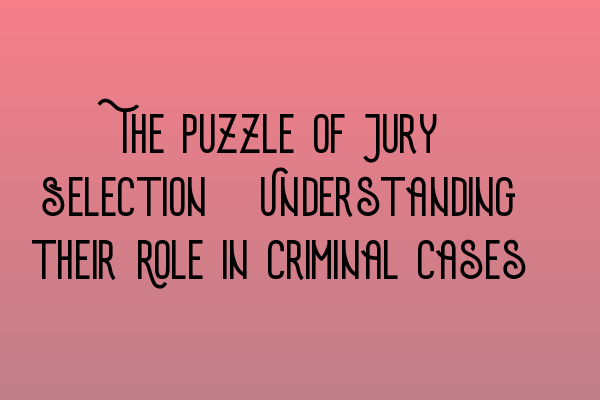The Puzzle of Jury Selection: Understanding their Role in Criminal Cases
When it comes to criminal trials, one of the pivotal moments is the selection of the jury. The jury, composed of members of the public, is responsible for determining the guilt or innocence of the defendant based on the evidence presented during the trial. In this blog post, we will delve into the intricate process of jury selection, exploring its importance in criminal cases and shedding light on the factors that influence the selection.
The selection of a fair and impartial jury is crucial to ensure that the defendant receives a fair trial. The jury should ideally be representative of a cross-section of society, chosen randomly from the available pool. However, the reality is often more complex. Both the prosecution and the defense have the opportunity to challenge potential jurors, based on various factors such as their personal background, beliefs, or potential biases.
Understanding the role of the jury in a criminal case is essential. Not only are they responsible for weighing the evidence, but they are also expected to be objective, unbiased, and open-minded. Their role is not to determine guilt based on personal opinion or emotion, but rather to reach a verdict based on the application of the law to the facts presented during the trial.
Throughout the selection process, both the prosecution and the defense attorneys engage in a strategic dance, attempting to select jurors who they believe will be sympathetic to their respective arguments. This process involves asking potential jurors a series of questions aimed at uncovering any potential biases or prejudices that may affect their ability to be impartial.
In order to comprehend the complexities of jury selection, it is important to be aware of the relevant legal principles and guidelines. Law students preparing for the Solicitors Qualifying Examination (SQE) focusing on criminal law and practice can benefit from comprehensive SQE 1 preparation courses, which cover the fundamentals of jury selection and related topics in depth.
Aspiring solicitors can also enhance their understanding of jury selection by practicing SQE 1 practice exam questions, which provide real-world scenarios for students to analyze and apply their knowledge. Additionally, attempting practice mocks such as FLK1 and FLK2 can help develop critical thinking skills and improve overall performance in the SQE 1 exams.
To achieve success in the SQE exams, it is crucial to be well-prepared by enrolling in SQE 2 preparation courses, which provide comprehensive coverage of the syllabus and equip students with the necessary skills to excel in their legal careers. The SQE 2 preparation courses include interactive sessions, mock exams, and personalized feedback to ensure students have a solid grasp of the complex concepts, such as jury selection.
Stay informed about the upcoming SRA SQE exam dates to plan your study schedule effectively. Being aware of the timelines and deadlines can allow you to allocate sufficient time for revision and practice, ensuring you are fully prepared for the SQE exams.
